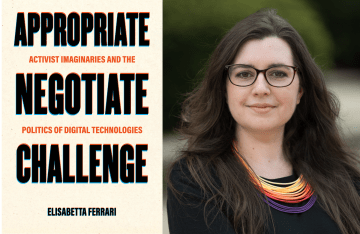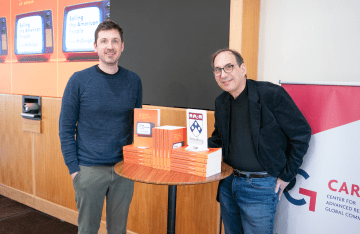Seth Grossman (C'01) Delivers 2017 Annenberg Graduation Speech
Grossman reflected on his time at Annenberg and offered advice to graduates.
Watch Grossman's speech.
On May 14, Seth Grossman (C'01), Chief of Staff to the President of the University of California, delivered the 2017 commencement address for Annnenberg's Communication Major Graduation Ceremony. Grossman's Communication major set the stage for an impressive early career: a Yale Law degree followed by a Supreme Court clerkship and then the role of Deputy General Counsel at the Department of Homeland Security. Click here to read more about Grossman.
The text of the speech follows:
"Thank you for that kind introduction. And congratulations to all of the graduates!
I can’t tell you how excited I am to be here with you today. I love being back at Penn, but I particularly love being back at Annenberg.
To me, it does not feel that long ago that I was sitting right where you are. Looking at the evidence though — as Annenberg taught me I always must do before reaching any conclusions — I must admit it has been quite a while.
When I was a freshman in 1997, the seniors were the last class that had started Penn without email addresses. For the large majority of my class, college was the first time they ever used email regularly. We often had to access the Internet by dialing in through a telephone line if we lived off campus; there was no wifi. We didn’t have Gmail or gchat.
To us, AOL, and particularly its instant messaging feature, felt like cutting edge technology. We didn’t have texting or emojis, but did feel pretty proud of ourselves for being able to combine a colon, a hyphen, and a parenthesis to make a smiley face. We certainly did not have Facebook, much less Twitter, or Instagram, or Snapchat.
There was definitely no DVRs, on demand, Netflix, or streaming. I remember clearly the semester I took Children and Media with Amy Jordan. For one of my papers, I was analyzing a certain television show that aired weekly on Fox. So I had to learn program my VCR in order to record the show on VHS tapes each week — if I missed recording an episode when it was broadcast, there was no method to get it another way. Sadly, unlike most of the other things I learned at Annenberg, my VCR programming skills quickly provide obsolete.
I tell you all of this not to date myself — to be honest, I had hoped it would take longer than 16 years to reach the equivalent of the “back in my day, I walked barefoot through the snow to get to school” territory — but with the hope that you’ll take compassion on your parents and your future bosses when they ask you how do you get something from the Twitters. One day, not as far into the future as you may think, you will be that person asking a 24 year old to explain a technology that is as natural to them as texting is to you. Trust me, it comes a lot quicker than you think.
Nevertheless, even though the technology has changed, the fundamentals of a Penn education have not. And one of those fundamentals is that Annenberg is a really special place. I felt lucky to be part of it when I was a student here. But over time, I’ve realized just how amazing an experience it was.
In every job I’ve had since I graduated — whether it was as a speechwriter, a Supreme Court clerk, a senior attorney in the Obama Administration, or a leader of the University of California — I’ve applied the lessons that Annenberg taught me:
- it is imperative to always think critically about information that is being communicated to you – both the content and the source;
- sometimes the medium matters just as much as the message; and
- nothing succeeds without effective communication.
Although all of these lessons are critical, I want to focus today on one that I learned while a student in Annenberg and has been critical to me since I graduated — the need to be an entrepreneur for yourself in your career. To me, this approach has three parts.
First and foremost, like all good entrepreneurs, you need to find people to invest in you. In this context, that means finding mentors that are invested in you and your success, and can provide the guidance, sounding boards, support, and connection to larger networks that will be critical to your career.
During my time at Annenberg, I was fortunate to find several mentors. Amy Jordan and David Eisenhower both provided excellent guidance as I was making the early decisions that shaped my career — should I go to law school? If I did, should I go directly or take time off?
When I was deciding where to go to law school in the spring of my senior year, another Annenberg mentor — Al Hunt — played a critical role. Torn between two schools, I asked Al if he had any advice for me. Al said he didn't, but he had a friend who was just the person to provide me guidance on this decision. Now Al being Al, of course his friend was the former solicitor general of the United States. Al introduced the two of us, and my conversation with Al's friend provided critical insight that helped me to make the decision where to go law school, a decision that ended up playing a huge role in my career trajectory.
This shows why having good mentors is crucial. Not only can they provide excellent guidance and support, but they also often have large networks that they can connect you with.
The other things to remember about mentors — they will not always be people older than you. Sometimes the most important mentors are your peers or near peers. After I graduated from law school, I had the great fortune to clerk for three of the nation's top judges, including Supreme Court Justice Stephen Breyer. While all three judges have been amazing mentors over the years, their other clerks, many not much older than I am, have been one of my most valuable sources of career guidance and support.
Much like most start-ups need early financial investment to succeed, the secret to most successful careers is the support of mentors along the way. They will help you navigate your career field; they will serve as sounding boards to bounce ideas off of; they will connect you to opportunities that you may not have otherwise encountered; and, perhaps most importantly, they will give you a push when you may be feeling discouraged or stuck.
So be on the lookout for those mentors — and, when you have experienced career success, be sure to serve as a mentor yourself.
Second, as an entrepreneur for yourself, you need to have a plan for your career but be prepared for things not to go as you expected — the greatest opportunities may be ones you could never anticipate now, or even a few years before they presented themselves.
Silicon Valley is full of very successful companies that began as something completely different. Slack, one of the most successful startups of the last 5 years, is a messaging and collaboration tool designed to revolutionize office communication. But its origins are much different — its creators set out to design a massive multiplayer video game. One small part of that videogame was a customized messaging tool. The videogame did not take off, but the founders realized they had something special in the messaging tool and used that to launch a company that is now worth 3.8 billion dollars and used by millions of people working in a range of companies.
If the Slack founders had been wedded to their original plan, and to that plan only, they would have given up when the video game didn't work out. But by being adaptable — and seeing they had a path to success even though it was different than the path they had originally envisioned — they reached tremendous heights of accomplishment.
Similarly, you may have a clear vision in your head for the trajectory of your career. You may envision being the next Andrea Mitchell, a top advertising executive, a documentarian for National Geographic, or the campaign manager for the next Barack Obama. And that is terrific. But you need to be prepared for your best laid plans to go in a different — and ultimately better — direction.
That was definitely the case for many of my fellow communication majors from the class of 2001. When we graduated, several of my friends intended to pursue careers in journalism. To them, that meant aiming for a job at the New York Times or Newsweek, often by working their way up through newspaper jobs in far-flung parts of the country that required them to file stories at most once a day.
But a few short years later, as you well know, the media landscape had dramatically changed. To be successful as a print reporter, you often needed to be able to file not once a day, but multiple times a day. And your reporting may often not appear for the first time in the print or online version of the publication, but in a series of 140 character messages. And the desirable places to work are often outlets that didn't even exist in 2001, such as Politico or Buzzfeed.
My classmates adapted and now several of them ended up the top reporters during the last election cycle. That would not have been the case if they had been unable to see beyond the limits of their original career plans.
This was definitely the case for me. When I graduated Penn in 2001, I thought I wanted a career that would allow me to work at the intersection of domestic policy and the law. However, I certainly did not envision that this goal would take me in an unexpected direction — to working as one of the top lawyers and policy officials on issues of homeland security during the Obama Administration. That would have been difficult to predict when I graduated, given that the Department of Homeland Security did not even exist at the time. By remaining adaptable, I had that amazing experience that I could have never expected.
So as you go out into the world, you may have a plan for your career. But a key component of that plan should be a willingness to change that plan. It may be hard, but it is worth it. After all, if even Cookie Monster can go from being a fixture of "old media" to being a social media star, so can you.
Third, and finally, the most important element of being an entrepreneur for yourself is that, in your career, you can never go wrong betting on you. For most successful entrepreneurs, whether it is Ben Franklin or Jeff Bezos, the key to their achievement is that they took a risk to pursue their vision for the future — they bet that their ideas, their hard work and determination, and their passion would lead to success.
The same principle applies to all of you. Betting on yourself may take many forms:
It could mean leaving a safe but unexciting job at an established firm to join a new, untested company that you believe is going to revolutionize your industry.
It could mean taking the risk of pitching your editor on an investigative series that will take months to report and may not pan out, but, if it does, would fundamentally change the way the country looks at a particular industry.
It could mean turning a side passion into a career.
It could mean going back to school mid-career to pursue an entirely new field.
Whatever form it takes, the bottom line is that you — your knowledge, your experiences, your insights — are your greatest asset and betting on yourself is always a risk worth taking.
Thank you so much for having me here today. It is always a pleasure to be at Annenberg, but it is particularly meaningful being here this year. It was 40 years ago that the leadership at Annenberg established the undergraduate communications major. I am deeply grateful that they took that step, and I know that all of you on the stage are as well. The mission of Annenberg — teaching people to think critically about the media in all its forms, how it reflects society, and how it shapes society — has never been more crucial.
And most importantly, congratulations again to the graduates! You should be very proud of what you've accomplished, and all that lies before you. In the immortal words of that great 80s one hit wonder — your future is so bright, you gotta wear shades."



